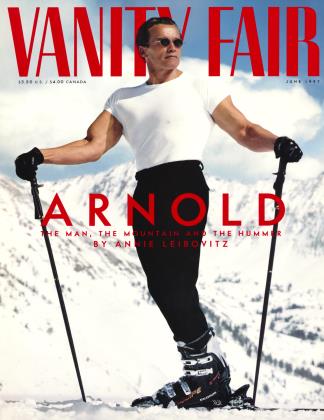Sign In to Your Account
Subscribers have complete access to the archive.
Sign In Not a Subscriber?Join NowEditor's Letter
Washington Monuments
We restore an old Vanity Fair tradition this month: in addition to our annual December-issue Hall of Fame, we are reviving the custom, started by editor Frank Crowninshield in 1913, of making occasional nominations to the Hall of Fame over the course of the year. Nominees during the Crowninshield era ranged from Elsie de Wolfe, Maxfield Parrish, and William Butler Yeats to Herbert Hoover (not as president, but as Calvin Coolidge's secretary of commerce), Walter Lippmann, George Gershwin, and Le Corbusier.
Our aim, now as then, is to celebrate people who are doing admirable things, who are trailblazers, and who are changing our culture for the better. We invite your suggestions.
To start things off, we have not one but two nominees this issue: John McCain, the Republican senior senator from Arizona, and Senator Russell Feingold, Democrat of Wisconsin. They are the odd-couple champions of the great political issue of our daycampaign-finance reform. McCain, the conservative son and grandson of navy admirals, spent five years as a prisoner of war in Vietnam. Feingold, who went to Oxford as a Rhodes scholar and then received a law degree from Harvard, is a traditional progressive. Since they began their bipartisan crusade in 1994, they have become virtual pariahs in the clubby, satisfied halls of that monument to political status quo—the United States Senate.
The 105th Congress may be shamed into passing sweeping campaign-reform measures—but only if pressure from voters and the press is relentless. This spring and summer, the House and Senate will hold hearings on campaign-finance abuses. Republican House committee chairman Dan Burton has already doomed his hearings to show-trial status by maneuvering to confine the scope of his investigation solely to the fund-raising scandals surrounding the Clinton White House. This ensures that the deeper problem—the unchecked flow of private and corporate money through both Republican and Democratic Party organizations to incumbent politicians—will go unexamined in the House of Representatives. (Burton, you may recall, is best known for trying to re-create the Vincent Foster suicide in his backyard using an antique gun and a watermelon.)
Over in the Senate, Fred Thompson, Republican of Tennessee, has resisted pressure from both sides to follow Burton's partisan lead. A former actor and trial lawyer with old-fashioned, statesmanlike charisma, Thompson is heading for a showdown reminiscent of High Noon when he chairs broad-ranging Senate hearings on campaignfinance reform that should include congressional, senatorial, and presidential elections. During the last race, Bob Dole and Bill Clinton spent a total of $2.7 billion—a sum greater than the individual profits of all but 25 of the country's 500 largest publicly traded companies. If Thompson, who himself reportedly has his eye on the White House in 2000, has his way, we could see a television marathon as crucial and riveting as the Watergate hearings, which so gripped the nation almost 25 years ago. With po Olympics, political conventions, or celebrity murder trials to divert our attention, Thompson may well rival Batman and dinosaurs in the public mind this summer.
 View Full Issue
View Full Issue












Subscribers have complete access to the archive.
Sign In Not a Subscriber?Join Now